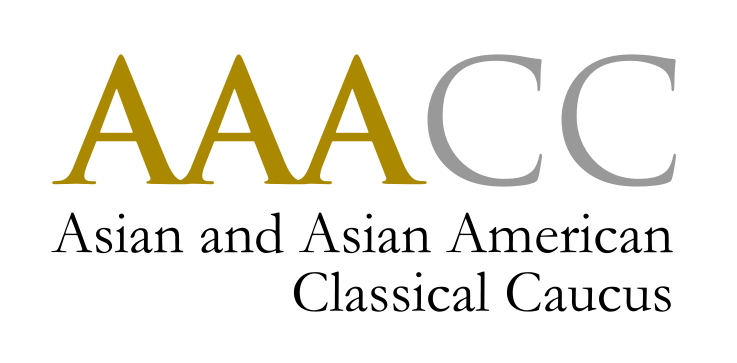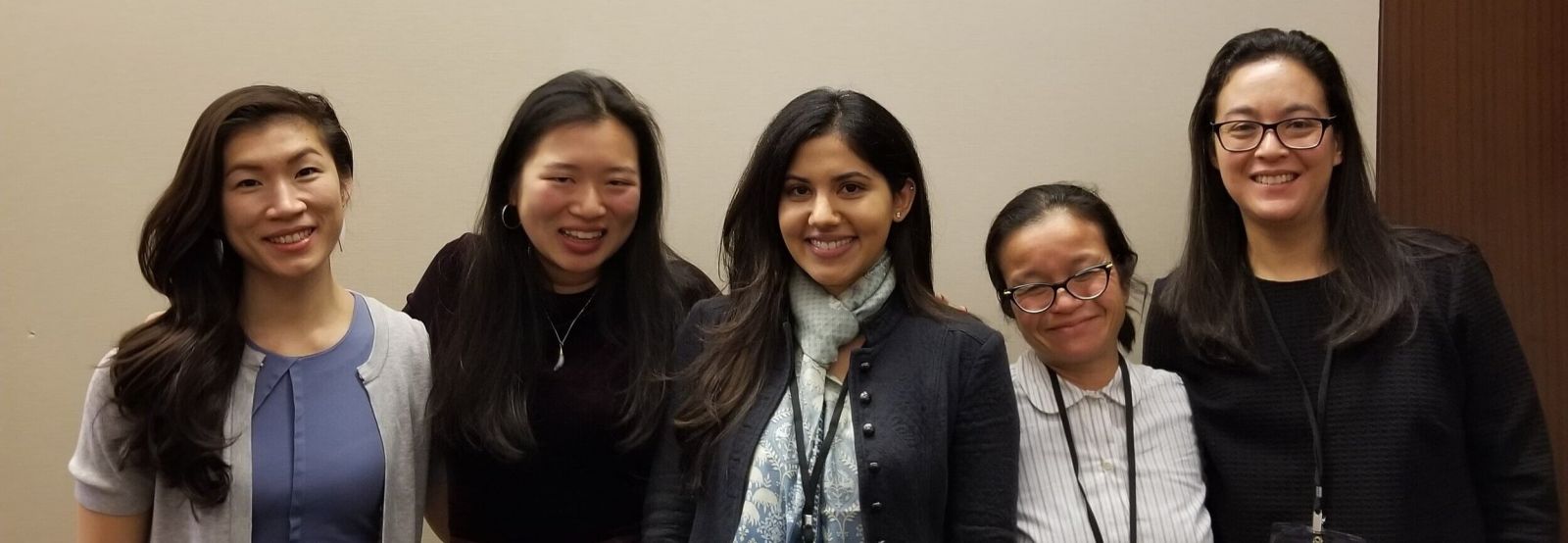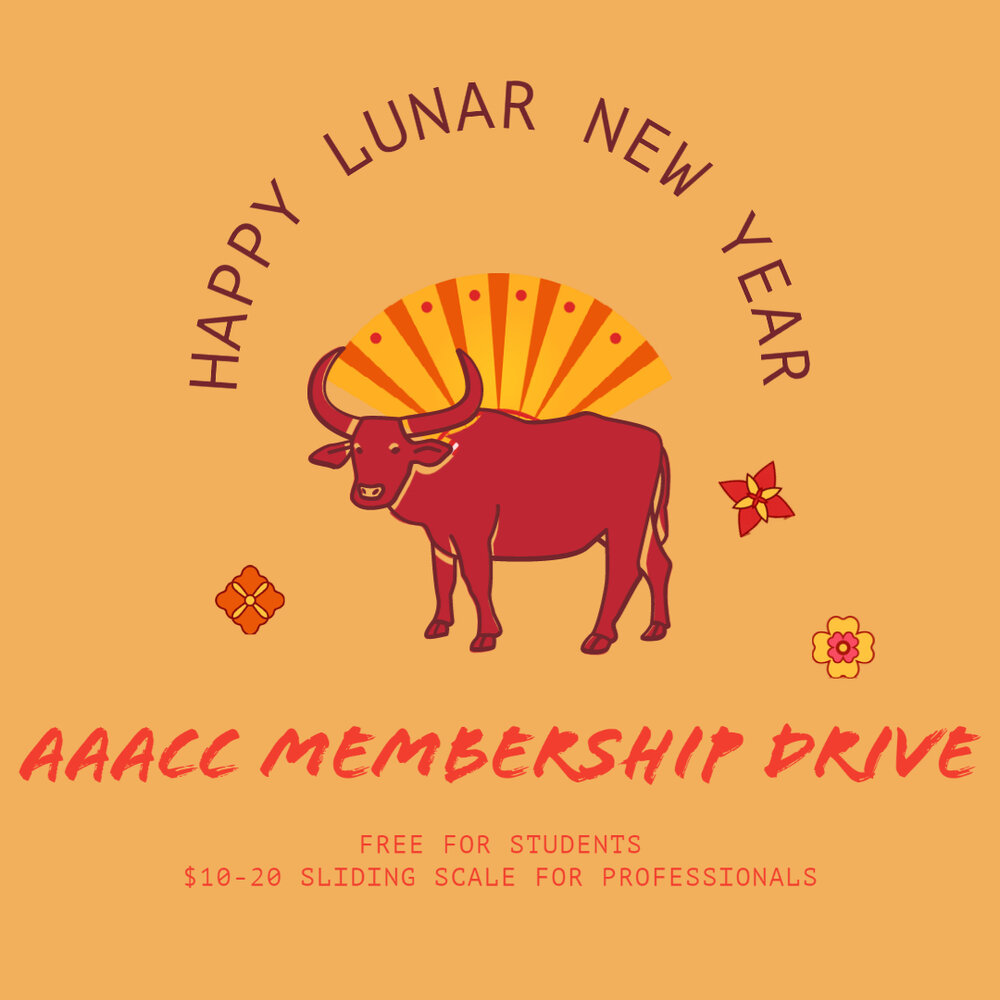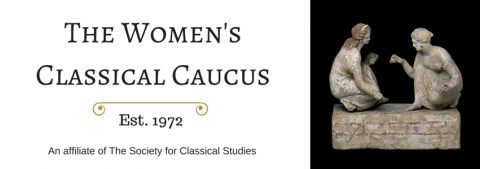Suzanne_Lye and Caroline Cheung
February 10, 2021
The Women’s Classical Caucus (WCC) invites you to celebrate the winners of its 2020–2021 Public Scholarship and Advocacy awards and to learn more about how their work is influencing our field. Over the next month, the SCS Blog will publish a three-part series of in-depth interviews by the WCC with the award winners, who discuss their work in strengthening communities within the field and introducing new audiences to Classics.
The WCC was founded in 1972 and is one of the oldest SCS-affiliated groups. The WCC seeks to incorporate feminist perspectives in the study and teaching of ancient Mediterranean cultures and strives to advance the goals of equality and diversity within the profession of Classics. The WCC is open to all and welcomes anyone who believes in its mission to join and participate in our exciting, new initiatives as we head into our 50-year anniversary (click here if you would like to volunteer!).
In Part 1 of our series, we highlight the winner of the WCC Professional Equity Award: the Asian and Asian American Classical Caucus (AAACC). Founded in 2019, the AAACC offers rich programming that promotes classical reception in Asian and Asian American culture (including a lively panel at the Annual Meeting), cultivates a vibrant mentorship program with over sixty mentors and mentees, and welcomes anyone in Classics to join.
Learn more about this new organization that is already making waves and building community from several of the officers/founders themselves in the following interview with Kelly Nguyen (Mentorship Coordinator, Brown University), Tessie Sakai (Secondary Education Liaison), Christopher Waldo (President, University of Washington, Seattle), Stephanie Wong (Outreach Coordinator, Brown University), and Elizabeth Wueste (Vice-President, The American University in Rome). The answers below have been lightly edited for length and clarity.

1. What is the AAACC origin story?
Chris Waldo: The AAACC essentially began at the 2019 AIA/SCS annual meeting in San Diego. I went to a talk that Kelly Nguyen was giving on classical reception in the Vietnamese diaspora. Kelly and I agreed that there should be a professional organization devoted to studying the reception of the classical tradition in contemporary Asian and Asian American culture.
Elizabeth Wueste: It is simultaneously shocking and not-at-all surprising that before 2019 there had been no professional Asian Classics association: as the much-lauded-but-always-discounted “model minority,” Asian representation in our field has always been quietly relegated as a non-entity. We are often taught to put our heads down, and the work will speak for itself. Instead, we at AAACC wanted to be more outspoken about our pride as Asians and Asian Americans. We wanted our field to know that we do fight daily against discrimination. We wanted our colleagues to know that we are a community with specific concerns, ideas, and interests that transcend academic disciplines. And while I can only speak for myself, I wanted to prove to myself that being Asian in academia and especially the Humanities, and even more so Classics, does not have to be a contradiction.
Chris: We also wanted to build a community of Asian and Asian American classical scholars. The AAACC developed out of these initial conversations, which included a number of people who eventually became involved in our organization as officers. We also have a board of directors composed of six classical scholars who were chosen for their experience in the profession and commitment to racial equity. We had a number of important early supporters, including Joe Farrell, former President of the SCS.
Elizabeth: I think I didn’t realize how needed the AAACC was until we hosted our first panel, “Classical Reception in Contemporary Asian and Asian American Culture,” just a year later at the 2020 Annual Meeting in Washington. I remember looking around the crowded conference room and thinking, “Wow, who knew there were so many of us! Across so many disciplines, age groups, and geographies!” We had all been silently existing alone in personal silos of our own making, without realizing that we were missing the power, comfort, and support of an Asian community in Classics. During the panel discussion, it became even more clear that when we gave our individual cultural experiences a designated place to interact, dialogue, and play, the results were powerful.
2. What is the AAACC’s signature programming? Who has been your target audience? What have you learned about your members through your programming?
Kelly Nguyen: Our signature programming includes the panel at the Annual Meeting, our mentorship program, and our nonacademic outreach events. It has been spectacular to see interest in Asian/American classical reception increase so markedly within just a few years. When I gave my talk on classical reception in the Vietnamese diaspora at the 2019 SCS meeting, the room was nearly empty, with just a few of my friends (like Stephanie!) there for support. So you can imagine my surprise when our inaugural panel in 2020 was standing-room only! And our most recent panel, “Classics in/out of Asia,” saw over 100 people come through.
Stephanie Wong: We also get a lot of engagement through nonacademic programs like our Quan Barry event; one of our strengths is drawing from activist and arts communities. Having taken on a nonacademic approach from the very beginning, I have published essays in Eidolon (here and here) and organized our interview series on diasporic Asian/American artists.
Kelly and I in particular love collaborating with political organizations like Novalia Collective to bring in nonacademic voices. We’re bringing the same energy into our 2022 SCS/AIA panel called “Orientalisms,” organized by Arum Park and me. We encourage applicants to submit their nontraditional projects as abstracts. As proof of Kelly’s mentorship program success, Arum and I met as a mentor-mentee pair and foresee a lasting collaborative partnership in our future.
Kelly: Three of the speakers at our 2021 SCS panel were mentees in the first iteration of our mentorship program. Patricia Eunji Kim was Suzanne Lye’s mentee, and Dora Gao and Helen Wong were Caroline Cheung’s. They all gave spectacular papers that blew away our audience — and Dora and Helen are only in their first year of their Ph.D. programs.

Panelists from the inaugural AAACC panel at the 2020 SCS/AIA Annual Meeting. Photo courtesy of AAACC.
3. What are the particular concerns of your members and organization? How does this drive your programming?
Stephanie: We started the AAACC to address the lack of community among Asian/American scholars and students, so a lot of what we strive towards is community building. This means extending beyond the AIA/SCS annual meeting; it means a lot of regular social media engagement and on-the-ground organizing. I consider the Sportula’s social media team a role model, as well as independent scholars like Vanessa Stovall.
Kelly: Stephanie pinpointed what is at the heart of the AAACC’s mission: to build community. One of the ways we do that is through our robust mentorship program. With the help of Suzanne, who is now one of our board members, we designed a mentorship program that provides both the traditional mentor-mentee relationship and a peer-to-peer one by pairing each mentor with two mentees. Through these mentorship groups, folks have access to different levels of support as they make connections with classicists from different stages in their careers.
Tessie Sakai: Secondary education programming in the AAACC is based on a philosophy of connection and care. Online blogs, sites, and groups make it easier to share resources and discuss anything from pedagogy to pandemic burnout. These networks are growing, and they share a strong sense of generosity and passion for education. At the same time, there will always be a need for intentional community-building among BIPOC teachers and students of Latin and ancient Greek. There are already so many demands on time and energy inside and outside the classroom, but when you are the only student or teacher of color in the classroom, or one of a few, it can take everything you have to keep up your learning and “prove” that you belong. The role of the AAACC in the world of middle and high school Latin is to create space for BIPOC teachers and students to meet, be themselves, and share their experiences of identity in the classroom.
4. What challenges and opportunities has the pandemic presented to your work and organization?
Chris: Our officers and board members are spread throughout the world, so we’ve been holding remote meetings several times a year since we started the organization. Having the AIA/SCS annual meeting be remote brought both positives and negatives. We were disappointed not to be able to hold our panel in person, but the remote format opened up some exciting opportunities for us; Stephanie was able, for instance, to host a virtual event with the writer Quan Barry, in which she discussed the influence of the classical tradition upon her work.
Stephanie: And it was so fun! We shine brightest in spaces, virtual or not, that eliminate vertical power structures. Over the summer, Kelly and I collaborated with our fellow educator and activist Vina Vo to host a fortnightly anti-racist reading group specifically for Asian/Americans, which opened up a beautiful and trusting space to learn from a group of more than sixty people of different backgrounds. We borrowed the same kind of sequence for the Quan Barry event, wherein Kelly hosted a one-off book club meeting to discuss Barry’s poetry, and I hosted the interview with the artist a week later, the same day as our SCS/AIA panel. Our Twitter and Instagram accounts have also been a great boon for connecting with our members and allies. And it’s wonderful to have fun on social media: for example, Tessie and I hosted a dumpling-making night on Instagram Live.
5. What challenges do you foresee the pandemic bringing for your organization and the field in general?
Chris: I think that the challenges brought by the pandemic for our organization are inextricable from those faced by the field in general. Our members are enduring the isolation and anxiety that comes with quarantine. The AAACC strives to provide an element of human connection to our members’ lives. Our mentorship program, for instance, took on a special significance during the pandemic, because it offered a unique venue for our members at different stages of their careers to connect with each other. The anti-racist reading group during the summer created a community of Asian American activists focused on working toward the goal of racial equity. I don’t know what the field and academia as a whole will look like once the pandemic is over, but I foresee our organization continuing to provide these kinds of spaces for the community of Asian American classicists.
In the past year, we grew as an organization and have tried to model our formal structure on other SCS affiliate groups like the WCC. We are currently discussing bylaws and how to better serve our membership. To get the help we needed to grow to our next stage, we decided we needed a board of directors and added the following scholars, who are at different types of institutions and stages in their careers: Yurie Hong (Professor, Gustavus Adolphus College), Suzanne Lye (Assistant Professor, University of North Carolina at Chapel Hill), Jinyu Liu (Professor, Depauw University), Jackie Murray (Associate Professor, University of Kentucky), Nandini Pandey (Associate Professor, University of Wisconsin-Madison), and Naoise Mac Sweeney (University Professor, University of Vienna). These board members have affiliations with Asia and/or Asian American identities through both their backgrounds and their work. They are advising us on how to build a strong global presence along with our American roots, especially since Classics is being increasingly taught in Asia and an increasing number of Classics students in the U.S. are Asian nationals or diaspora.

Image courtesy of AAACC.
6. What message would you give to your younger selves and other young Asian and Asian American scholars or students pursuing Classics?
Elizabeth: Don’t try to divorce your academic self from your identity. You are a whole person, and the two aspects should not and cannot be separated from each other. Lean into it, and it will make both your scholarship and your personal identity more fulfilling.
Chris: You are not alone! There is a whole vibrant community of Asian and Asian American classical scholars, even if this is difficult to see from the perspective of your department.
Stephanie: Your body is an archive and you have the right (and prerogative!) to explore it.
Kelly: An unhoused man in San Francisco once told me, “Don’t be afraid, just be aware.” I have kept his words with me all these years as I forged my own path in Classics. I now pass on his advice to all of you.
7. What do you want people to know about your organization?
Stephanie: We built the AAACC as a space for coalition and community.
Kelly: We are always open to collaboration within and beyond our community — please do not hesitate to reach out.
Chris: This organization exists for its members. We want to know what kinds of programming and services our members would like to see in the future. We’re excited to tailor the AAACC to the specific needs and concerns of our membership.
Elizabeth: One stereotype is completely true — most of our conversations are about food. Who is eating what, planning the next meal, what food we wish we knew how to prepare at home. It is simultaneously a joke and also a core part of our cultural identity to focus on what we eat!
8. How does winning the WCC Professional Equity Award affect your work?
Stephanie: Our mission has always been to focus on education and outreach, and I think it’s exceptionally important to put equity first and be professional second.
Elizabeth: What began as a series of excited and optimistic dinner conversations has gained enough traction that others are noticing. I know that, when I was a young grad student, everything resembling organizational leadership of the field looked daunting, unattainable, and closed from the perspective of an outsider. I want other scholars to know that we are here and welcome them with open arms into our growing community!
Chris: I hope that the amplification of our message that will come with winning this award will draw more people into our organization. Building community is perhaps the most important thing that we do.
Kelly: It is wonderful to be recognized for our work, especially since we only launched two years ago. Our scattered community has come together to achieve so much in such a short amount of time — and an especially difficult time in which anti-Asian sentiment and violence surged in the U.S. and globally. This award represents our resilience and our strength, but it also signifies how much more work is still needed to achieve equity in our field. Our work is not done until we no longer need the AAACC.
To learn more about the AAACC and about all of the WCC’s award winners, come to our virtual awards ceremony on Wednesday, Feb. 17 8PM EST. Also, stay tuned for Parts 2 and 3 of this WCC blog series.
This blog post was produced by the Women’s Classical Caucus (WCC). The coordinators of this three-part series featuring WCC Award winners are Caroline Cheung and Suzanne Lye, two of the co-chairs of the WCC.
Header image courtesy of AAACC.
Authors



